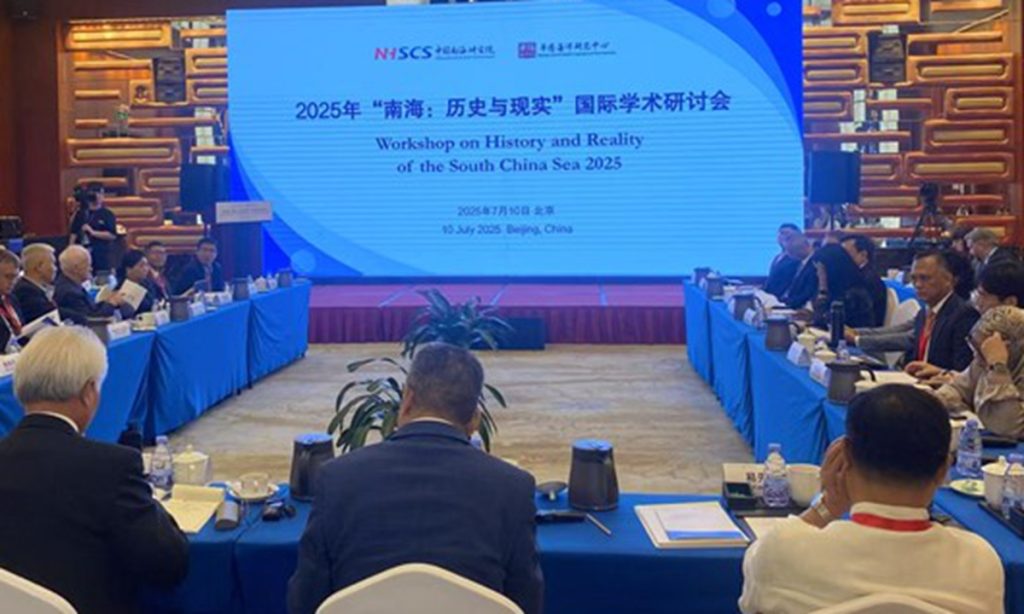Workshop spotlights South China Sea's history and reality; experts refute illegal arbitration rulings

A workshop held Thursday brought experts together from multiple countries to examine the historical context and current realities of the South China Sea issues, with some refuting the legitimacy of the so-called South China Sea arbitration award, from a legal perspective.
The Workshop on History and Reality of the South China Sea 2025 was held in Beijing on Thursday, organized by the Huayang Center for Maritime Cooperation and Ocean Governance and the National Institute for South China Sea Studies. More than 150 experts from over 10 countries including China, Malaysia, Japan, Philippines, and Germany participated in the event.
China's sovereignty over the islands in the South China Sea has a full historical and legal basis, and the Chinese people have administered the South China Sea since ancient times, Wu Shicun, Chairman of Huayang Center for Maritime Cooperation and Ocean Governance, said during his keynote speech at the beginning of the workshop.
History reflects reality, showing that China's efforts to safeguard these islands are a defense of the post-WWII international order and the fundamental principles of international law recognized by the UN Charter, rather than an attempt to undermine them, Wu said.
Wu said that the South China Sea situation currently faces three major challenges. First, the US' involvement has intensified tensions, strengthening military deployments under the pretext of "freedom of navigation" and supporting other countries' unlawful claims.
Neighboring states have escalated infringing activities, with the Philippines provoking incidents at Ren'ai Jiao and introducing intermediate-range missile systems, endangering regional security, Wu noted.
Also, negotiations on the Code of Conduct in the South China Sea allow no optimism, as external forces exploit illegal arbitration rulings to interfere with the process and undermine crisis management efforts between China and ASEAN, he added.
Wu also rejected the so-called South China Sea arbitration award in 2016, stating that it is completely invalid due to the tribunal's overstepped authority, unfair composition, and erroneous fact-finding. He emphasized that the ruling has become a "ticking time bomb undermining stability in the South China Sea."
"Their legal interpretation of what constitutes an island that is entitled to claim full jurisdictional zones is unheard of. They adopted it based on a very strange interpretation," Phillip Saunders, adjunct professor from the Schulich School of Law of Dalhousie University in Canada, told the Global Times.
"China had the right to exclude jurisdiction over issues related to matters of sovereignty over land territory, and this clearly involves sovereignty over land territory," he added.
"The South China Sea is currently the source of tension and problems between the Philippines and China, because they are focusing on territorial disputes and maritime jurisdictional conflict, but we need to emphasize the idea that the South China Sea shall not define the overall bilateral relationship between the Philippines and China," Rommel Banlaoi, president of the Philippine Society for International Security Studies, told the Global Times.
Banlaoi pointed out that the best way to resolve the dispute is to resume bilateral relations through dialogue and consultations, with rebuilding confidence as the key factor. He explained that both sides need to start talking again, rebuild trust, and promote mutual understanding in order to cooperate, as there is currently a lack of confidence between the two sides.
Certain countries are complicating the peaceful resolution of disputes in the South China Sea, Banlaoi said, adding that the ASEAN way is the best approach to managing conflict in the South China Sea, while the current [Philippine] government's alignment with the US approach is only complicating the issue.
He told the Global Times that the relationship between the US and China is also impacting the current situation, as the Philippines, heavily influenced by the US, is being used in its "geopolitical rivalry against China."
"For Malaysia, we always believe in cooperation and no conflict," Salawati Mat Basir, professor from the National University of Malaysia, told the Global Times, adding that Malaysia doesn't want to harm its relationship with China. External interference, particularly from the US, only makes the situation worse for ASEAN countries, she added.
During the workshop, Wu called on regional countries to jointly safeguard the post-World War II international order, reject external interference, accelerate consultations on the Code of Conduct, and build a South China Sea community with a shared future through practical maritime cooperation.